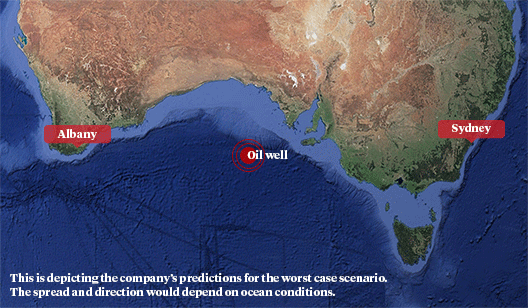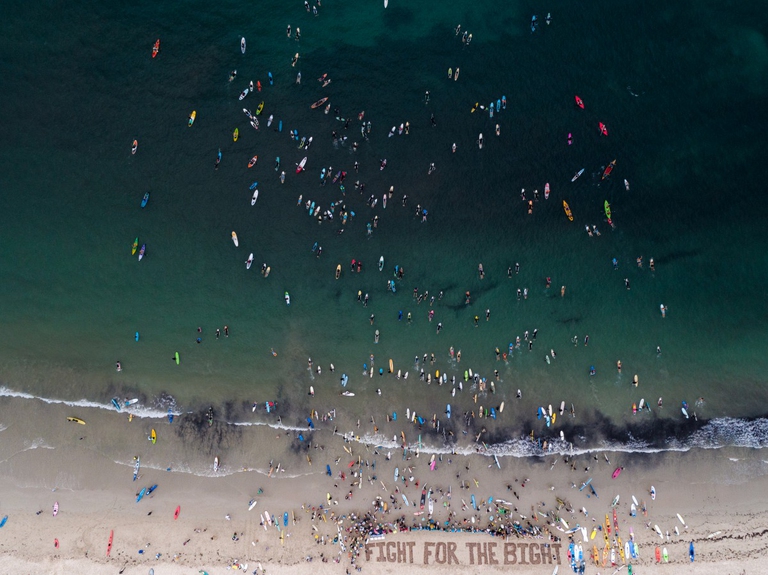
A group of experts in Tokyo suggested pouring radioactive water from Fukushima into the open sea. A marine biochemist explains the consequences of this absurd decision.
Norwegian oil giant Equinor had pulled out of drilling for oil in the Great Australian Bight, one of the country’s most uncontaminated areas. A victory for activists and surfers who are now campaigning for the area to be protected forever.
The Great Australian Bight, one of the most uncontaminated places on Earth, will remain untouched by oil platforms as local communities, activists, surfers and the huge variety of species who inhabit the area breathe a sigh of relief. This immense marine area along Australia’s southern coast, spanning over thousands of kilometres, won’t be invaded by oil drilling activities planned by Norwegian energy company Equinor.
Exactly a year ago, Equinor published the project’s first draft as well as an environmental plan open to comments by the general public, which was then presented to the Australian government. The project showed that a potential oil spill could have devastating effects on most of the bight’s waters, with disastrous consequences for biodiversity. From that moment onwards, surfers, activists and ocean lovers came together to resist the project in a global mass movement known as Fight for the Bight. Despite the protests, the Australian government decided to go ahead and approve the draft. The decision was like a death sentence for the bight and all of its untouched, beautiful nature in the name of a lucrative thirst for petroleum.
Read More: Surfers and activists are fighting to keep southern Australia free from oil
But then, Equinor took a step back. Suddenly, the company announced it would abandon drilling plans in the bight entirely. Jone Stangeland, the company’s country manager, declared that “following a holistic review of our exploration portfolio we’ve concluded that the project’s potential isn’t commercially competitive compared with other exploration opportunities in the company”. The decision, therefore, appears to be motivated by fears of potential economic risks rather than concerns about an ecological catastrophe.
Equinor, whose project was estimated at 200 million dollars, isn’t the first to pull out from oil drilling in the Great Australian Bight, with Chevron and BP (the company behind the Deepwater Horizon disaster) already abandoning such plans in the past. On its part, the Australian government has been openly welcoming investors to exploit the presence of oil in the area, expressing disappointment at Equinor’s decision to abandon the project. The government highlighted Australia’s need to increase its security and independence by having control over its own petroleum. “We used to be self sufficient but now we rely heavily on imported oil,” Senator Matthew Canavan tweeted, whilst Minister for Resources Keith Pitt announced that the country will be seeking new opportunities for oil drilling in its waters.
Despite the government’s position, the victory has been celebrated with great joy by the activists who dedicated months to raising awareness around the globe about protecting the Great Australian Bight. Yet, the fear of being confronted by similar threats in the future is still looming. This is why activists have asked local authorities and the government to designate the bay as an area under permanent environmental protection, also considering that scientists have found that a staggering 85 per cent of the species living in the bight can’t be found anywhere else on the planet. What is more, whales migrate to the bay from Antarctica to reproduce and raise their offspring. As Greenpeace activist Jamie Hanson pointed out, there are more unique species in the bight than in the Great Barrier Reef.
Oil drilling must cease if we don’t want to risk facing an environmental catastrophe in the future. Hopefully, activists won’t need to resort to holding up their surfboards in protest but can ride them, undisturbed, into the waves of this untouched and unique place that deserves to be protected once and for all.
Siamo anche su WhatsApp. Segui il canale ufficiale LifeGate per restare aggiornata, aggiornato sulle ultime notizie e sulle nostre attività.
![]()
Quest'opera è distribuita con Licenza Creative Commons Attribuzione - Non commerciale - Non opere derivate 4.0 Internazionale.
A group of experts in Tokyo suggested pouring radioactive water from Fukushima into the open sea. A marine biochemist explains the consequences of this absurd decision.
The decline in grey and humpback whales in the Pacific and Atlantic Oceans has been traced to food shortages caused by rising ocean temperatures.
The United Nations has launched a major international alliance for ocean science, undertaking a mission close to all our hearts.
The cargo ship that ran aground off the coast of Mauritius on 25 July, causing incalculable damage, has split in two and its captain has been arrested.
The largest coral reef in the world is severely threatened by climate change, but researchers are developing strategies that could contribute to saving the Great Barrier Reef.
Seychelles have extended its marine protected area, which now covers over 400,000 square kilometres, an area larger than Germany.
30 per cent of the planet needs to be protected to stop precipitous species decline. The UN has set out its aims for the the COP15 on biodiversity scheduled for Kunming, China in October.
Ocean warming has risen to record highs over the last five years: just in 2019 the heat released into the world’s oceans was equivalent to that of 5-6 atomic bombs per second. The culprit, no doubt, is climate change.
Refusing the anthropocentric vision and respecting the laws of ecology is the only way to safeguard the future of our and all other species, Sea Shepherd President Paul Watson argues in this op-ed.










